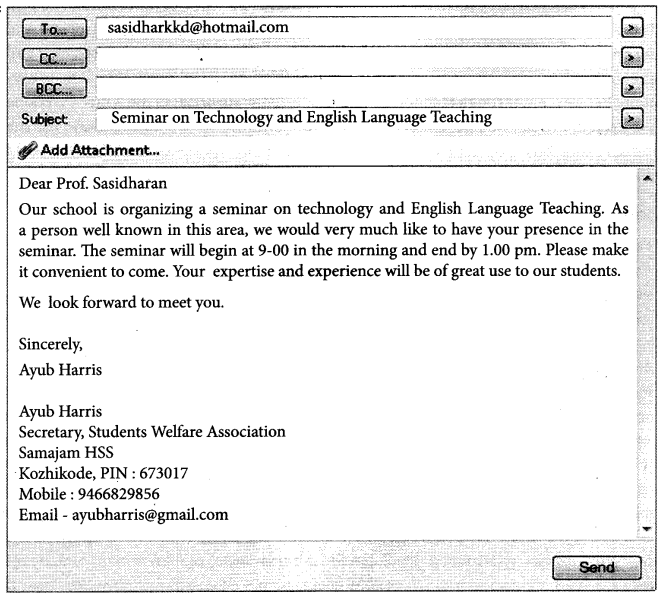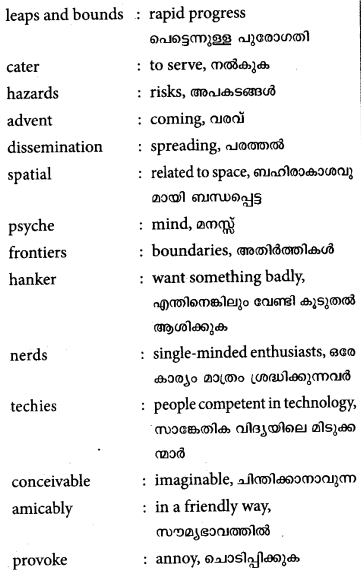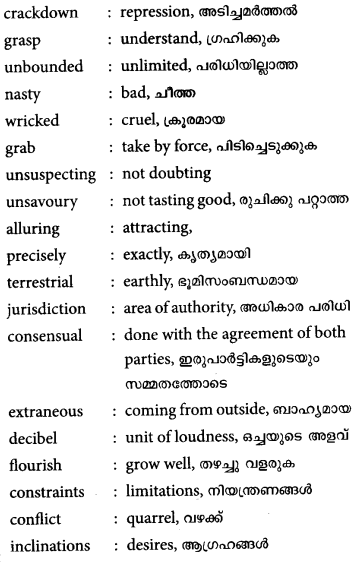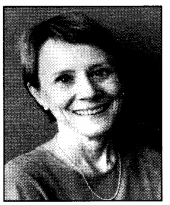Kerala Plus One English Textbook The Cyber Space Questions and Answers Unit 6 Chapter 1 (Essay)
The Cyber Space (Essay) Textual Questions and Answers
Question 1.
What is special about the ‘modern psyche’?
Answer:
The modern psyche loves new frontiers. We love wide-open spaces; we like to explore; we like to make rules instead of following them.
Question 2.
What is cyberspace? How has it evolved over the years?
Answer:
Cyberspace is the community of networked computers. It is the imagined place where electronic data goes. Before J#was a playground for computer nerds and techies. But now it embraces all kinds of people, including children.
Question 3.
What type of metaphor is used by the author to describe cyberspace?
Answer:
To describe the cyberspace the author has used the metaphor of real estate. Real estate is an intellectual, legal, artificial environment constructed on top of land. It recognizes the difference between parkland and shopping mall, between red-light zone and school district, between church, state and drug store. In the same way we can think of cyberspace as a giant and unlimited world of virtual real estate.
Question 4.
Mention some of the traditional metaphors used to denote cyberspace.
Answer:
Some of the traditional metaphors used to denote cyberspace are highways and frontiers.
Question 5.
Why does the author maintain that censorship will not work in the case of cyberspace?
Answer:
The author maintains that censorship will not work in the case of cyberspace because it is not a frontier where bad people can grab unsuspecting children. It is also not a giant television that telecast offensive messages at unwilling viewers. In cyberspace users choose where they visit, what they see and what they do. It is optional.
Question 6.
Why is cyberspace described as a voluntary destination? Do you agree with the author here?
Answer:
Cyberspace is a voluntary destination because you have to go some place in particular. People can choose where to go and what to see. I fully agree with the author.
Question 7.
Who, according to the author, are the right people to set the standards?
Answer:
According to the author, the right people to set the standards are the cyberspace communities themselves.
Question 8.
What are the three major areas of services available in cyberspace?
Answer:
The three major areas of services available in cyberspace are: First, the private email conversations similarto the talks you have on the telephone or voice mail. Second, the information and entertainment services. Here people can download anything. These places are like book stores, malls and movie-houses. Third, there are ‘real communities’- groups of people who communicate among themselves. They are like shops or restaurants or playgrounds. Each participant contributes to a general conversation, generally through posted messages. Other participants may simply listen or watch.
Question 9.
What is in store for cyber communities in future?
Answer:
Cyber communities will have to have a moderator because anyone is free to post anything. Because of that there will be unwanted advertising, discussions that are. not healthy and rude participants. Then the cyberspace will become too noisy. To keep these negative elements in check a moderator would be needed.
Question 10.
What are the comparisons made by the author between cyberspace and terrestrial communities?
Answer:
What is special about cyberspace is that it frees us from the tyranny of power structures of the terrestrial communities. Cyberspace allows communities of any size and kind to flourish. In cyberspace communities are chosen by the users, not forced on them by accidents of geography. This freedom gives the rules in cyberspace a moral authority that rules in terrestrial environments don’t have. Most people are forced to stay in the country of their birth. But if you don’t like the rules of cyberspace community, you can quit. It is love it or leave it, which is not possible in terrestrial communities.
Activity -1 (Writing)
Question 1.
A group of students are asked to prepare a list of Dos and Dont’s of using the cyberspace. They list the points as given on p. 167 of the Text. Classify the ideas generated under the following heads. Write the corresponding number.
Parents : …………
Teachers : …………
Students : …………
Counsellor: …………
Answer:
Parents : 2, 4,7
Teachers : 5, 8
Students : 1
Counsellor: 3,6,9
Question 2.
Now, write an article on the use and misuse of cyberspace for your School Magazine using the hints given in the text.
Answer:
Use of computers has become widespread and accordingly the uses and misuses of the cyberspace have also multiplied. Cyberspace is an excellent way of getting information, giving information and also for entertainment. But it has potential dangers. These days we hear a lot about cybercrimes. The culprits are mostly young people, including students. Even as we acknowledge the importance of cyberspace in the modem world, should be aware of its potential dangers and how to avoid them.
Cyberspace is full of sites that give vulgar and explicit sex material. Young children are naturally curious about these things. So to prevent them from watching these things privately in their own rooms, computers should be kept in open view in a common hall. This way, children will be discouraged from visiting bad sites. There should be specific time schedule for browsing the net. Late-night browsing should b discouraged. When students are given assignments and projects they rush to the cyberspace for material. They download material from it and copy it in their assignments. Teachers should check the authenticity of the sources used in the papers given by the students. Many schools and colleges now have computers and the Internet, including Wi-Fi. Teachers must ensure that students do not misuse these facilities.
Counsellors have also a big role to play in the right use of the cyberspace. They should conduct awareness programmes on the various cyber security measures. The net addicted children should be given counselling in the school.
Students should be aware of the risks involved in the use of cyberspace. It is easy to fall into the mire of bad habits. It would be difficult to get out. Ultimately they are responsible for their acts and they are the masters of their destiny. They should not reveal their e-mail address to everyone and should use the cyberspace sensibly. Cyberspace is a double edged tool. It is like a knife and it can be used to cure (like a surgeon) or to kill.
Activity – II (email)
Read the email given on page 168.

Question 1.
What is this mail about?
Answer:
It is an application for a job.
Question 2.
How is it different from surface mails?
Answer:
It is different from surface mails in different ways:
- It has no address of the receiver (except the email address),
- It has no date
- It has no signature of the sender
- The sender’s name and address are given at the bottom with the mobile number and email address.
In the surface mail these appear on the top part of the letter.
Question 3.
Analyze the language structure, style and format of the email.
Answer:
The language is simple and straight. Block style is used with all the paragraphs aligned to the left.
Question 4.
Imagine that you organize a seminar on Technology and English language Teaching in your school. In order to ensure the presence of the distinguished scholars invited, you draft a detailed email about the seminar.
Draft the email to be sent to the visiting dignitaries.
Answer:
To: [email protected]
Subject: Seminar on Technology and English language Teaching
Dear Prof. Job
Our school is organizing a seminar on Technology and English language Teaching. As a person renowned in this realm, we would very much like to have your presence during the Seminar. The seminar will begin at 9.00 in the morning and it will end by 1.00 p.m. Please make it a point to come. Your expertise and experience will be of great use to our students as well as staff.
We look forward to meeting you.
Sincerely,
Simi Hyder
Simi Hyder
Secretary, Students’ Welfare Association
AlAzharHSS
Mala
PIN – 679342
Mobile: 8547028805
Email – simihyder@gmail. Com
II. Read And Reflect
Are you familiar with the i-pod generation? You see them everywhere, at railway stations, busy places in the city, or even in remote villages. You may be one of them. What is so special about them and how do you distinguish them? Read on to know about the ultramodern representatives of today’s youth.
The Cyber Space (Essay) About the Author
Esther Dyson is an American technology analyst. She is a leading commentator on digital technology, biotechnology and space. The present article is a discussion on the possibilities and challenges involved in the use of cyberspace.

The Cyber Space (Essay) Summary in English
Page 164: Something in the modern psyche loves new frontiers. We love wide-open spaces; we like to explore; we like to make rules instead of following them. Is there a place you can go and be yourself without worrying about the neighbours?
Yes, there is such a place: cyberspace. Before, it was a playground for computer nerds and techies. But now it embraces all kinds of people, including children. Can they all get along in a friendly way in the cyber world? Or will our fear of kids misusing the cyberspace provoke a crackdown?
First of all we ought to know what cyberspace is. For this we have to leave behind metaphors of highways and frontiers and think instead of real estate. Real estate is an intellectual, legal, artificial environment constructed on top of land. It recognizes the difference between parkland and shopping mall, between red-light zone and school district, between church, state and drug store.
You can think of cyberspace as a giant and unlimited world of virtual real estate. Some property is privately owned and rented out; other property is common land; some places are suitable for children; others should be avoided by all but the strangest citizens. Unfortunately, it is those places that are now capturing the popular imagination. They make cyberspace sound like a bad place. Good citizens therefore say: Regulate it.
Page 165: Using censorship to silence cyberspace misinterprets the nature of cyberspace. It is not a frontier where bad people can grab unsuspecting children. It is also not a giant television that telecast offensive messages at unwilling viewers. In this kind of real estate, users choose where they visit, what they see and what they do. It is optional. It is easier to bypass a place on the net than it is to avoid a block of bad stores on the way home.
Cyberspace is a voluntary destination or many destinations. You choose a site. That means you can where to go and what to see. Community Course Book standards should be enforced but those standards must be set by cyberspace communities themselves. We don’t want control from outsjjfe; we need self-rule.
The cyberspace is so interesting because it is different from shopping malls, television, highways and other terrestrial jurisdiction. So, let us define its territory:
First, there are private email conversations similar to the talks you have on the telephone or voice mail. These are private and done with the consent of both the parties. So they require no regulation.
Second, there are information and entertainment services. Here people can download anything. These places are like book stores, malls and movie-houses. The customer needs to request an item. Some of these services are free, for some you have to pay.
Third, there are ‘real communities’-groups of people who communicate among themselves. They are like shops or restaurants or playgrounds. Each participant contributes to a general conversation, generally through posted messages. Other participants may simply listen or watch. Many of these services started out un¬moderated. But now some rules are imposed because of unwanted advertising, outside discussions, and increasingly rude participants. Without a moderator, the decibel level often gets too high.
Page 166: What is special about cyberspace is that it frees us from the tyranny of power structures. In a democracy, minority groups and minority preferences get squeezed out. Cyberspace allows communities of any size and kind to flourish. In cyberspace communities are chosen by the users, not forced on them by accidents of geography. This freedom gives the rules in cyberspace a moral authority that rules in terrestrial environments don’t have. Most people are forced to stay in the country of their birth. But if you don’t like the rules of cyberspace community, you can quit. Love it or leave it.
What is likely to happen in cyberspace is the formation of new communities. Instead of a global village, we will have another world of self-contained communities that will cater to the wishes of their members without interfering with anyone else’s. We will be able to test and evolve rules regarding what should be governed. These may include content and access control, rules about privacy and free speech.
Our society needs to grow up. It means understanding that there are no perfect answers and solutions. We don’t have a perfect society on earth and so we won’t have a perfect cyberspace. What we can have is individual choice and individual responsibility.
The Cyber Space (Essay) Vocabulary


